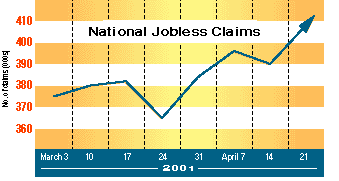
HOT TOPICS LIST
- Strategies
- Stocks
- Buy
- Investing
- Brokers
- Psychology
- Interviews
- Accumulate
- Sell
- Hold
- Spotlight
- Websites
- Candlestick Corner
- Gold & Metals
- Options Trading
LIST OF TOPICS
MARKET COMMENTARY
Recovery In Sight?
05/30/01 02:15:39 PM PSTby Jayanthi Gopalakrishnan
Recovery In Sight?
| On April 18, 2001, the Federal Reserve Bank surprised investors by cutting interest rates by 50 basis points. Since then, investors seem to have become optimistic; the Nasdaq has climbed by almost 30%. After a 70% drop in the Nasdaq and nearly a 30% drop in the Standard & Poor's 500 since their peak in early 1999, the Nasdaq has gone up about 30% and the S&P 500 by 12%. Stock valuations did come down significantly when the markets dropped. Valuations are still high, but at least they are a lot more realistic. Analysts fear investors are going to scramble to load up again on stocks and raise those valuations to the exuberant levels they were at not so long ago. Before you rush to the markets and load up on stocks in hopes they will once more provide triple-digit returns, pause for a moment and reflect on the underlying fundamentals of the US economy. WHAT LIES BENEATH Incidentally, the economic numbers that have been released since the rate cut suggest it's not as bad as we may have thought. In the first quarter of 2001, the US economy grew at a faster-than-expected 2%. Consumer spending rose 0.3% in March, together with a 0.5% growth in personal income. Businesses are also spending more, as evidenced by the 1.1% growth in business spending and the 1.1% rise in capital spending. Even excess inventories, which were recently seen as a problem, actually declined. This is good news; it means companies are able to sell their inventories and will be less inclined to pull back on production. The ailing manufacturing sector also looks as if it may have bottomed out; analysts are expecting it to improve in the coming months. Does this mean the worst is over?
Maybe, maybe not. The biggest risk lies in the unemployment figures, which are looking weak. The number of jobless claims continues to increase. Major technology companies such as Motorola, Inc. (MOT), Intel Corp. (INTC), and Dell Computer Corp. (DELL) have announced layoffs. Dow Chemical Co. (DOW) recently announced it has more than doubled the number of workers it had planned to lay off. Unfortunately, this can cause the few optimistic signs to turn negative. An increase in unemployment could result in a decrease in consumer spending, a decline in consumer confidence, and less capital for the equity markets. Stronger-than-expected consumer spending helped decrease excess inventories, so if there is a decrease in spending, it could mean that excess inventory may once again be a problem. The Fed has cut interest rates by 200 basis points so far this year. This reduction can be seen as a remedy for a weakening economy, but it's going to take more than a rate cut to improve the economy. Keep an eye on the underlying fundamentals, especially unemployment. If unemployment starts moving in a positive direction, recovery may actually be in sight. Editor Jayanthi Gopalakrishnan can be reached at Jayanthi@Traders.com Current and past articles from Working Money, The Investors' Magazine, can be found at Working-Money.com.
Copyright © 2001 Technical Analysis, Inc. All rights reserved. |
Staff Writer
| Title: | Staff Writer |
| Company: | Technical Analysis, Inc. |
| Address: | 4757 California Ave SW |
| Seattle, WA 98116 | |
| Phone # for sales: | 206 938 0570 |
| Fax: | 206 938 1307 |
| Website: | working-money.com |
| E-mail address: | Jayanthi@traders.com |
Traders' Resource Links | |
| Charting the Stock Market: The Wyckoff Method -- Books | |
| Working-Money.com -- Online Trading Services | |
| Traders.com Advantage -- Online Trading Services | |
| Technical Analysis of Stocks & Commodities -- Publications and Newsletters | |
| Working Money, at Working-Money.com -- Publications and Newsletters | |
| Traders.com Advantage -- Publications and Newsletters | |
| Professional Traders Starter Kit -- Software | |
PRINT THIS ARTICLE

Request Information From Our Sponsors
- StockCharts.com, Inc.
- Candle Patterns
- Candlestick Charting Explained
- Intermarket Technical Analysis
- John Murphy on Chart Analysis
- John Murphy's Chart Pattern Recognition
- John Murphy's Market Message
- MurphyExplainsMarketAnalysis-Intermarket Analysis
- MurphyExplainsMarketAnalysis-Visual Analysis
- StockCharts.com
- Technical Analysis of the Financial Markets
- The Visual Investor
- VectorVest, Inc.
- Executive Premier Workshop
- One-Day Options Course
- OptionsPro
- Retirement Income Workshop
- Sure-Fire Trading Systems (VectorVest, Inc.)
- Trading as a Business Workshop
- VectorVest 7 EOD
- VectorVest 7 RealTime/IntraDay
- VectorVest AutoTester
- VectorVest Educational Services
- VectorVest OnLine
- VectorVest Options Analyzer
- VectorVest ProGraphics v6.0
- VectorVest ProTrader 7
- VectorVest RealTime Derby Tool
- VectorVest Simulator
- VectorVest Variator
- VectorVest Watchdog

